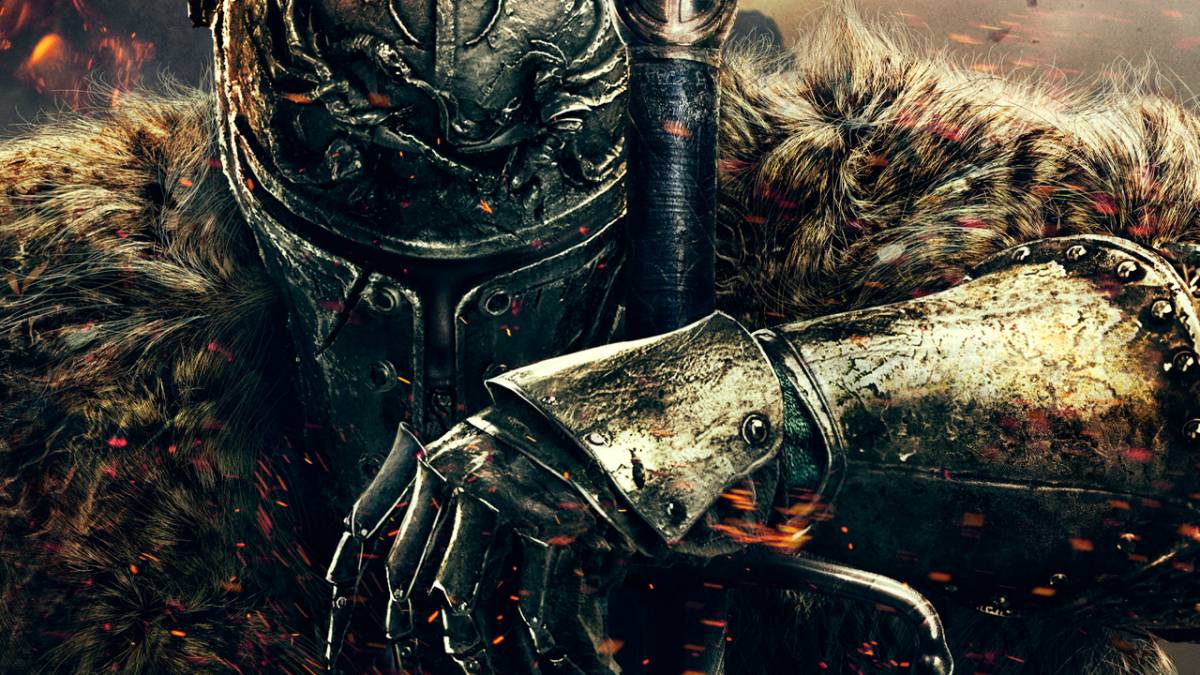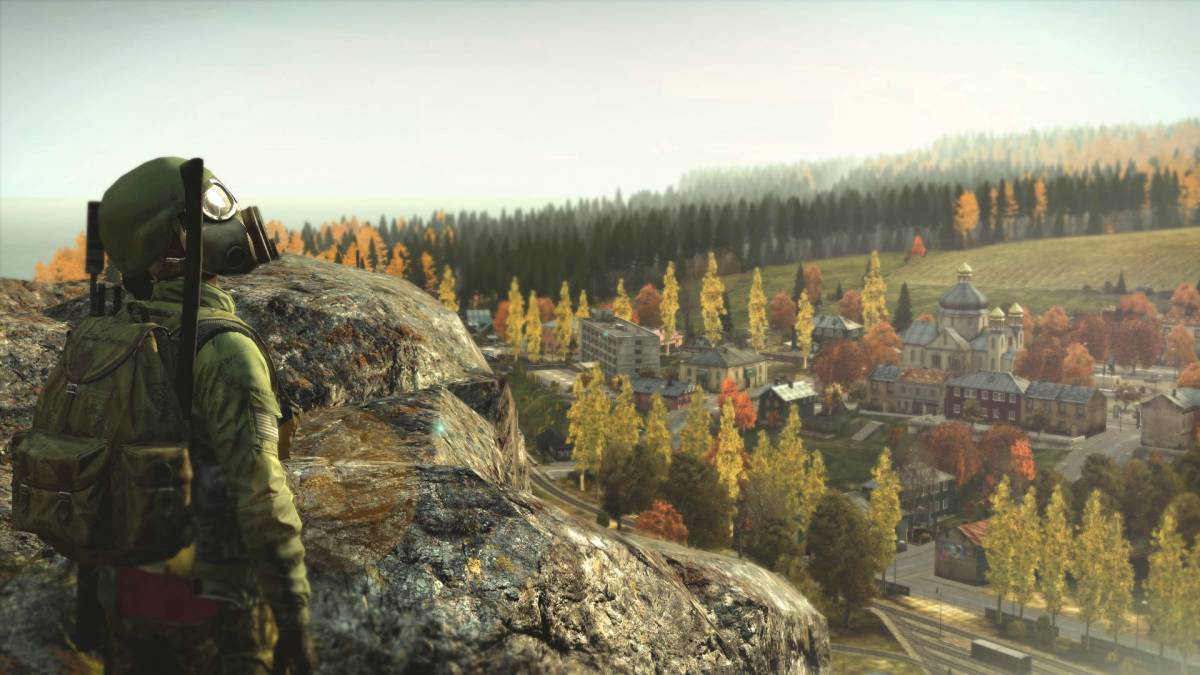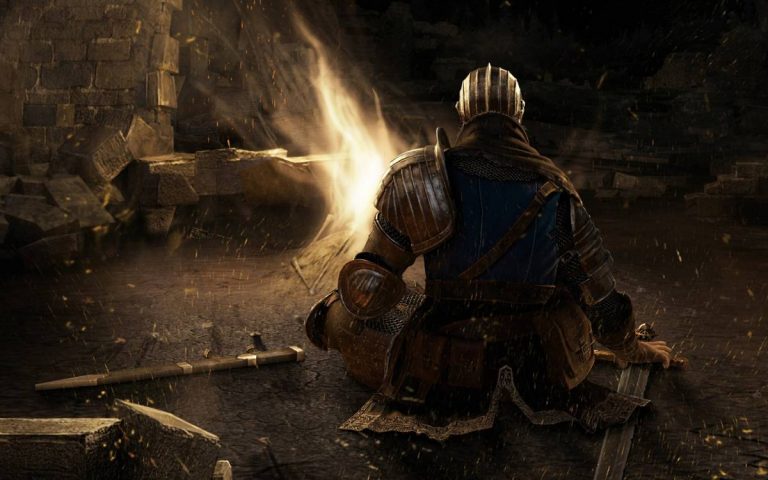In the run up to finally biting the bullet and joining the next generation, I’ve been looking into some last-gen games which passed me by when they were new. Well, I’m supposed to be doing that, but one in particular has gradually started taking over my life like some sinister, abusive imaginary friend – Dark Souls.
I’ve only logged about 25 hours of play so far but for me that’s a big deal, I haven’t committed myself to game on the same level in a long time. At time of writing I’ve just finished slogging my way through the nightmarish tangle of rickety bridges, poisonous water and assholes with blowdart guns that is Blighttown. Dark Souls has a very vague, distant plotline which comes together through various disparate fragments as you progress, but most of the time you just struggle from place to place, backtracking, grinding to harvest souls and getting beaten into the filth by a horrifying circus troupe of bosses the size of naval vessels.
Despite this, it’s one of the most enthralling games I’ve ever played, and a lot of that is down to the overwhelming feeling of desolation that runs through it. Usually in Dark Souls if you’re actually, truly alone, it’s a savoured reprieve between breathless bouts of monster-mashing, but in a way, you’re always alone, even during your fleeting encounters with friendly NPCs or when you enlist other players to help you dispatch an especially tough boss. You’re cast out in a dark, cloying, unfriendly world and all you can do is keep moving forwards until it all starts to make a bit more sense. It’s this sense of alienation and isolation that has made so many video games so compelling as a form of story, but why?

When you describe it in those terms, it sounds awful, but it’s caught on massively in recent years. One of the latest trends in multiplayer gaming (although it’s tapering off a bit now) is the open world survival game. These usually involve being dropped into a hostile environment with little to no supplies and having to cobble together enough raw material to build a shelter, gather resources and craft enough tools and weapons to be able to make meaningful progress. The other players you meet along the way can either help you out in a tight spot, ally with you, ignore you outright or in some cases just kill you and take your stuff, because people suck.
Minecraft was really the game that brought all this to the forefront, but we’re going to come back to that later, for now let’s focus on the other game that sparked this revolution – DayZ. Beginning in life as a mod for Arma II, it works exactly as described above, with the hostile environment in question being a vast, open space of valleys, woodland and abandoned buildings, all of them crawling with the undead.
It’s the kind of game you play at a snail’s pace. Whilst zombies in games like Dead Island and Dead Rising
are just lively blood piñatas, even a one-on-one encounter with one in the early stages of DayZ can be fatal, and it’s very rare that you ever catch one alone – they hunt in packs. As a result, you find yourself nervously crawling through the map with your head on a swivel, scrutinising every bristling breeze and change in the light. It’s amazing that you can spend more than half an hour crawling through a forest on your belly in any game and never get bored, but a game with no story or character investment? Incredible. Sadly, nothing that’s come out since has managed to replicate the same kind of compulsion that DayZ offers. Some of them remove the zombie element and make it all about survival through hunting and gathering, others ramp up the danger by switching them out for even more dangerous things, like dinosaurs, but none have really captured the same spirit.

A lot of it has to do with DayZ getting there first, but when games do manage to evoke that very particular kind of isolation, it sticks with you. Lively, populated worlds in games never feel anywhere near as absorbing as empty ones do. Look at the difference between Red Dead Redemption and GTA V
. They run on the same engine, many of the mechanics are similar and they share staff at almost every level of production. Yet, there is no moment, anywhere in GTA V which can match a quiet, long horseback ride across the Mexican planes or the mountains in the North in Red Dead. GTA V’s world is bigger, it’s more complex, but it lacks personality, it’s too busy and scatterbrained. Red Dead Redemption feels so much more alive, to the point at which even just spending some time existing in that environment is enough to make you want more.
This brings us back around to Minecraft. In single player mode, the only other beings you ever encounter in that game that are friendly and in any way advanced are the villagers, and they just kind of wander around making weird grunting noises. In Minecraft the enjoyment comes from being creative, from finding resources and doing interesting things with them, but equally I’ve loaded it up before, started a new world and just gone walking, even in peaceful mode. There’s no challenge to it and the list of things you’re liable to encounter isn’t all that long, but you could wile away hours just exploring the progressive world laid out ahead of you. Transmitting yourself into a big, desolate, virtual world is a kind of freeform, self-sustaining storytelling that only games can really achieve.
The freedom to strike out alone and explore new worlds is what attracted to me to video games almost from the outset. I’m not necessarily an introvert or any kind of loner, but I’ve always been able to appreciate that everyone needs time to themselves. I’ve always championed walking as an essential part of a healthy lifestyle, even if it’s just half an hour every other day. Worlds feel more real when you’re free to move around them as an observer, rather than being rushed from checkpoint to checkpoint. Often you’re made to feel like an unwelcome presence, an intruder, particularly in things like Shadow of the Colossus and Metroid Prime
(two of my all time favourites), which is an elegantly simple way to help the player understand the story without telling them anything.
 Using that tool, the actual storytelling component can be deeply complex or simple and straightforward and the sense of worldliness will carry it forward. Take Journey, all you do from start to end of that game is travel forwards towards a mountain, at which point you ascend into some higher plain of existence. There are enigmatic nods to a deeper history and wider universe, but most of it is left to the imagination. Other players appear as muted fellow travellers, it doesn’t matter who they are, their goal is the same as yours. I’m struggling to think of another game which had me so invested in a nameless, wordless sprite. On the opposite end of the spectrum you have something like Dear Esther
Using that tool, the actual storytelling component can be deeply complex or simple and straightforward and the sense of worldliness will carry it forward. Take Journey, all you do from start to end of that game is travel forwards towards a mountain, at which point you ascend into some higher plain of existence. There are enigmatic nods to a deeper history and wider universe, but most of it is left to the imagination. Other players appear as muted fellow travellers, it doesn’t matter who they are, their goal is the same as yours. I’m struggling to think of another game which had me so invested in a nameless, wordless sprite. On the opposite end of the spectrum you have something like Dear Esther, which has you moving across a Hebridean island as an emotional, complicated narrative is recounted by your character. It’s more of an interactive story than a game, but the environment around you pulls you into the story and makes it something so much more organic.
All kinds of storytelling benefit from treating their settings as characters, but video games have a distinct advantage in this way – they allow you to know that character almost as well as it’s possible to know them. You can explore every inch of that world, know every short cut, every clearing, every safe haven from danger. Sometimes the world changes every time you load up, sometimes it’s constant and in the case of the upcoming No Man’s Sky (pretty much the only reason I’m getting a PS4), it’s almost endless, stretching out so far that it would take thousands upon thousands of hours to see it all. Regardless of that, the experience is fundamentally yours, and yours alone. Loneliness is typically regarded as a negative emotion, but in gaming it really isn’t, it’s a bridge between what the creators are offering and what you’re taking in with you. Even in bustling action games, the slower, more desolate moments are very often the most memorable. The ice climbing section of Uncharted 2, the post-nuke death sequence in Call of Duty 4
and the Normandy crash site in Mass Effect 2
are some standout examples of that.
Ultimately, our enjoyment of storytelling is as much about what we bring to it as what the creators are offering. Different mediums are always going to be better suited at different things, and gaming lays an almost uniquely strong claim to desolation, as well as things like fear, exasperation and guilt. The other difference though is consistency of pace; books, TV shows and films decide on their own how fast things are going to move, the best games leave that decision almost entirely up to you. To feel alone in a game is to feel like you really have been transported to a new world, it’s not even about progressing it’s just about getting out of your head and existing somewhere else for a while. It’s really gratifying to see so many developers making the most of that power now.
Some of the coverage you find on Cultured Vultures contains affiliate links, which provide us with small commissions based on purchases made from visiting our site.

